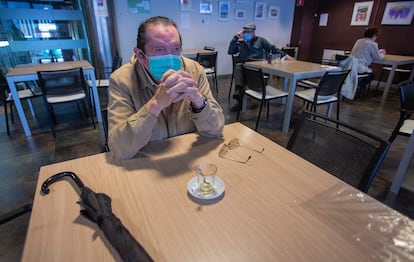Spanish seniors on the coronavirus pandemic: ‘If the virus doesn’t kill us, sadness will’
A social life on hold, fear of going out and difficulties with new technology are exacerbating the loneliness felt by the elderly, who account for 20% of the population of Spain

Maria Yéboles became a widow at the age of 57. At that stage of her life, her struggle revolved around securing her widow’s pension – one day she even ran into then-Labor Minister Javier Arenas at a restaurant, and took it up with him. Now, at the age of 89, she is the president of the Zamora Widows Association and is still struggling, but these days the fight is about preventing women her age from becoming isolated in their homes, fearing the virus and falling sick with sadness.
“A few days ago, at midnight, a friend phoned me,” she recalls. “She said to me, ‘María, I’m really scared and I feel terrible; I haven’t been out for three months.’ She said her daughter wouldn’t let her go out because she was afraid she would catch the virus. So I called her daughter and said, ‘Either you take your mother out for a walk tomorrow or I’ll take her out myself.’ Really, enough is enough. I know they’re doing it to protect us, but they’re wrong. We’re old, not stupid.”
María and her friends belong to a demographic of nine million Spaniards over the age of 65. Of this group, representing 20% of a population of 47 million, more than two million live alone. And of those who live alone, 72% are women. Now, the virus and the measures to tackle its spread are destroying the world that Spain’s seniors were looking forward to enjoying during their retirement.
Some, like Guillermo García, a former Civil Guard officer in La Palma del Condado, in Huelva province, are trying to be philosophical about the situation. “I am already 87 and I used to make up to five trips a year with the IMSERSO [a state-funded program for seniors that includes travel packages], but now that’s been suspended and I am grounded. I hardly go any further than the local square, have a coffee with a friend, and head back home. You don’t go out with the same cheerful feeling you used to; now you go out self-consciously, so it’s like you’re not really going out at all.”
For Ena Velasco, 70, the world has become an uphill battle, and even a trip to the local square in Madrid’s La Ventilla neighborhood is too daunting. “The lockdown left us, the elderly, traumatized,” she says. “A young person can say that this will be over at some point. But we can’t. They are making the end of our lives a bitter one. That’s how I feel – bitter. I used to go to two cultural centers, but now they’re closed. They tell you to keep in touch online, but they don’t know if you have a computer, or if you can afford to pay the internet service fee. Everything is set up for young people. They are used to everything being virtual, but we need to touch, to feel, to see the teacher, our grandchildren, the doctor. Even the doctors don’t take care of you anymore; they are also confined, protecting themselves, scared. You call the clinic and they don’t answer the phone, and when they do, they give you an appointment for a phone consultation several months down the line, even if you tell them you have depression and are plagued by horrible thoughts. Up to now, I felt young, but not anymore. If the virus doesn’t kill us, sadness will.”
Cristina Martín belongs to Tangente Cooperative Group, an association of cross-disciplinary professionals who offer solace to women like Ena Velasco, helping them fight loneliness by building solidarity networks across Madrid. “In recent months, the closure of senior and cultural centers has made the feelings of isolation and loneliness far worse,” she says. “There is a real lack of social and family contact, which in many cases has been having an adverse effect on health. And as they are also an ‘at-risk’ demographic, the anguish and fear translate into stress, anxiety and sleep disorders.”
Digital divide
Maite del Campo is 66 and lives in San Sebastián, in the Basque Country. Her mother, Josefina, is 89 and lives in Zamora. When the total lockdown came into force, mother and daughter would fix a time to chat on the phone and walk up and down the hallways of their respective homes while they talked. “She came up with the idea and it was a really good one,” says Maite. “My mother is terrified of standing still. She knows that at that age it’s very difficult to regain mobility after it’s lost.”
Due to an increase in life expectancy, there is a growing number of mother-and-daughter duos like Maite and Josefina. “We’re both retired,” explains Maite. “But the 23 years that separate us seem like more, because of the digital divide. We have access to things they can’t even imagine, and I’m a little afraid that the same thing will happen to us in a few years. Look at the banks, for example. I’ve already watched two people in front of me leaving the cash dispenser without doing what they needed to do because they didn’t understand the technology. Also, those of us who had access to technology during the lockdown were able to continue seeing each other, while for my mother’s generation the only contact was by phone.”
Rafael Villafranca has spent his working life as a teacher, and he is now president of the Cascante Retirement Club in Ribera de Navarra, in the region of Navarre. In recent years, his main focus has been to get retirees to leave their homes and make sure they always have something to keep them occupied. “On Tuesdays and Fridays, we had bingo at the pensioners’ club,” he says. “There were always at least 60 or 70 people there, with the women dressing up for the occasion. Then there were the IMSERSO outings, and also the day trips that we organized on our own. The last one was in March to the Basilica of Javier [in Navarre], but now there’s nothing.”
Consequently, Villafranca’s concerns have shifted. “There is quite a lot of fear among the elderly,” he says. “I know there are people who want their parents to go out, but their parents don’t want to. It’s a real worry because it seems to me that it will be difficult to get things back to how they were. It’s not going to be easy for them to feel brave enough to return to their previous lives. It will take two or three years, and that’s a long time at that age.” Then he mentions the hardest part: “The last time I gave my grandchildren a hug was during the carnival,” back in February.
On a recent Friday afternoon, at the pensioners’ center on Idiakez street in San Sebastián, only one table was occupied. José Luis, an 84-year-old retired watchmaker, was keeping to his afternoon routine, which began when the virus turned his world upside down. “After having lunch at home with my wife and daughter, I come here for a coffee, watch TV and return home at around 6pm. I used to go out with my friends, but now my friends don’t go out and this is all I do.”
The new normality is an 84-year-old man sitting alone in the middle of an empty bar, watching TV from behind a facemask, with his umbrella on the table.
English version by Susana Urra.
Tu suscripción se está usando en otro dispositivo
¿Quieres añadir otro usuario a tu suscripción?
Si continúas leyendo en este dispositivo, no se podrá leer en el otro.
FlechaTu suscripción se está usando en otro dispositivo y solo puedes acceder a EL PAÍS desde un dispositivo a la vez.
Si quieres compartir tu cuenta, cambia tu suscripción a la modalidad Premium, así podrás añadir otro usuario. Cada uno accederá con su propia cuenta de email, lo que os permitirá personalizar vuestra experiencia en EL PAÍS.
¿Tienes una suscripción de empresa? Accede aquí para contratar más cuentas.
En el caso de no saber quién está usando tu cuenta, te recomendamos cambiar tu contraseña aquí.
Si decides continuar compartiendo tu cuenta, este mensaje se mostrará en tu dispositivo y en el de la otra persona que está usando tu cuenta de forma indefinida, afectando a tu experiencia de lectura. Puedes consultar aquí los términos y condiciones de la suscripción digital.









































